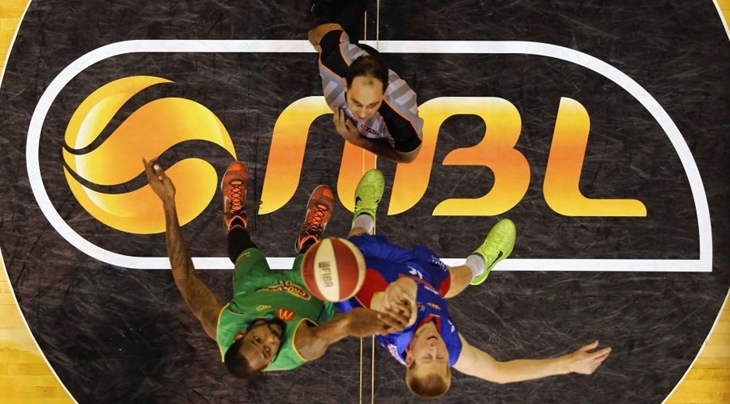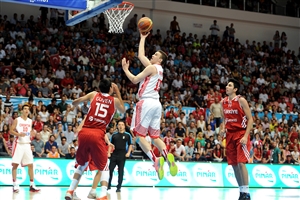
How did the NBL get so low?
MELBOURNE (Paulo Kennedy's View from Downunder) - Last week I was determined not to be distracted by off-court woes, to focus on the great on-court action in Australia and New Zealand instead.
But this week, with the NBL's plight going from bad to worse with Townsville and Wollongong in voluntary administration, I lost my battle.
Too many kids playing on courts around Aus to let this league die. All our players were there once looking up to @NBL players. #WeAreTheNBL
— Oscar Forman (@oscarforman) March 11, 2015
So where to start? Well, I'll begin while driving on the Peninsula Link freeway south of Melbourne on Wednesday, listening to Perth Wildcats boss and NBL Board member Nick Marvin talking on ABC Radio.
One particular phrase Nick used caught my attention. He contrasted the plight of some struggling clubs by mentioning "what I've achieved" in Perth.
What the Wildcats have achieved in Perth is to re-establish the enormous brand the club had through the late 1980s, 1990s and early 2000s, and then take it to a new level.
In New Zealand, CEO Richard Clarke and his team have turned a country traditionally indifferent to basketball into Breakers fans and created similarly huge brand recognition.
What the Breakers and Wildcats - Clarke and Marvin - have in common, is they have utilised the extreme generosity of rich owners to employ good people, establish quality programs, implement good ideas and bounce back from mistakes.
Both clubs are model operations and should be congratulated, but when I hear Marvin using that to criticise other clubs, who don't have such generous benefactors, for not performing to the same level, I can only scratch my head.
Firstly, it reminds me of a kid who inherited a million dollars and then went to school and asked his mates why they aren't rich as well.
Secondly, and most importantly, the stories of those two clubs are classic examples of spending money to make money.
So when the owners took back control of the league in 2013, with New Zealand and Perth representatives on the board, they clearly understood success could be achieved by investing in the product.
Yet for some reason that I cannot fathom, they have failed to do so at league level.
As I understand it, a recent appointment has brought the number of staff running league HQ to eight. That's under half the number at Marvin's Wildcats, and less than New Zealand and Melbourne too.
It's hundreds less than other major sporting codes in Australia. How do you think many AFL clubs would be faring if there were only eight employees in that league's front office?
Marvin also made it clear during his interview that the league is sick of loaning money to clubs and not getting it back.
But my question is why hasn't the NBL been providing the sort of support to clubs they were critical of Basketball Australia for neglecting or delivering poorly? The sort of support that would have cut clubs' costs and improved their capacity to generate revenue.
Things like centralised marketing, sponsorship, media, membership campaigns and deals with state and local associations.
After taking over TV broadcasts, why hasn't the NBL used them to promote the league as an overall story via league-wide highlights and features, and promote clubs via clever promotion of game nights, ticket sales and memberships?
Given the league has fallen well short in those areas, I think a first important step right now is to stop blaming clubs who are trying to operate on an oily rag for running out of petrol.
The next step is to figure out how the league can make those clubs' operations better without loaning money, starting by leading the way with a professional operation from league office.
So far, the NBL Board has chosen not to go down that route, and we have seen the results.
The first year post-demerger that was understandable, as the focus was on cutting costs, but this season, with key commercial deals now up for negotiation, the league needed to be at its shiny best and failed dismally.
We are now two years down the track from the demerger and there appears to be little clear immediate or long-term strategy, despite the on-court action being close to the highest standard we've ever seen.
All I have to say was this last season was great for ALL fans of the game. Great product with great fans! Hoops WILL succeed. #WeAreTheNBL
— Daniel Kickert (@kicks14) March 11, 2015
This week, Boti Nagy publicised an in-depth proposal to buy the competition, which he believed was presented by Melbourne owner Larry Kestelman in September last year.
Now if the owners didn't want to full buy into such a plan that's fair enough, given Melbourne's major botching of its own rebrand last off-season, but that proposal as presented by Nagy has a lot of good ideas that could be incorporated into the league's vision regardless.
Similarly, the board may have chosen to abandon ex-CEO Fraser Neill's vision, but there are aspects of it which will help the league sell itself to broadcasters if incorporated into the current model.
This is where the NBL needs leaders who can make decisions for the best of the league, and not allow influential clubs to sideline good ideas because they don't match their vision.
Having said all that, I'm not in the business of playing the blame game for the sake of it, and what I'd prefer is for the owners and management to take honest stock of their current position and learn from those mistakes.
For all the doom and gloom, the NBL is just a relatively moderate TV deal away from being in a position to grow.
To achieve that growth, the money needs to be spent at league level. Without that, clubs will continue to be left to sink or swim on their own and there will always be someone with their hand in the air.
My message to those who are making decisions on behalf of clubs, players and supporters is to recognise that strength comes through solidarity, that solidarity comes through removing individual motivations, and that can only happen in the NBL's case via independent governance.
Right now, you have the chance to set the NBL up for the future or run it into the ground - choose wisely.
Very optimistic the NBL will succeed. Level of competition is super high! As a kid I loved watching Gaze, Heal, J Smith + DMac #WeAreTheNBL
— Matthew Dellavedova (@matthewdelly) March 11, 2015
Paulo Kennedy
FIBA

















